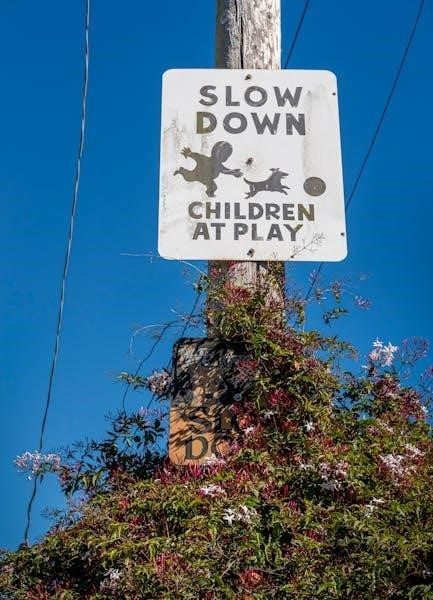
mr burns a post electric play pdf
Explore Anne Washburn’s dark comedy, blending apocalypse with pop culture, as survivors rebuild society through storytelling, weaving The Simpsons into myth, offering a haunting yet humorous reflection on resilience and cultural evolution․
Background and Overview
Written by Anne Washburn with music by Michael Friedman, Mr; Burns, a Post-Electric Play is a black comedy exploring survival and cultural evolution post-apocalypse․ The story follows a group retelling a The Simpsons episode, which evolves into myth over 80 years․ Presented by Samuel French, Inc․, it features additional music by Carol Young, blending dark humor with a haunting vision of society’s rebirth through storytelling․
Key Themes and Genre
Mr․ Burns, a Post-Electric Play blends black comedy with dystopian drama, exploring themes of apocalypse, survival, and the evolution of pop culture into mythology․ The play critiques capitalism and media’s enduring influence, even in a post-electric world․ Through its unique genre, it examines how societal values and narratives transform when civilization is stripped to its core․ Washburn’s work challenges audiences to reflect on resilience, cultural memory, and the power of storytelling in shaping identity amid collapse․
Plot Structure and Narrative
Mr․ Burns, a Post-Electric Play unfolds in a post-apocalyptic world without electricity, where survivors cope by recounting episodes of The Simpsons․ The narrative spans years, tracing the evolution of a small group into a theater troupe that mythologizes the cartoon, blending dark humor with a haunting vision of cultural rebirth․
Setting and Apocalyptic Context
The play is set in a post-apocalyptic world where electricity has vanished, plunging society into chaos․ The story unfolds in a bleak, barren landscape, where survivors gather around a campfire to recount stories, particularly episodes of The Simpsons․ This desolate setting serves as the backdrop for exploring how culture and storytelling evolve in the absence of modern technology․ The apocalyptic context emphasizes human resilience and the enduring power of narrative to create meaning in a shattered world․
Story Arcs and Character Development
The play intertwines multiple story arcs, tracing the evolution of characters like Mr․ Burns, Bart, and others from their origins as TV figures to mythologized symbols․ Through dark humor and emotional depth, the narrative explores how these characters adapt to a post-apocalyptic world, revealing their vulnerabilities and strengths․ The story arcs highlight the transformation of pop culture into shared mythology, while the characters’ development reflects humanity’s struggle to find purpose and connection in a shattered reality․

Themes Explored in the Play
The play delves into themes of apocalypse, survival, and the evolution of pop culture into mythology, exploring how stories redefine purpose and meaning in a shattered world․
The Apocalypse and Survival
The play explores a post-apocalyptic world where electricity has vanished, forcing survivors to rely on storytelling and memory․ Mr․ Burns examines how individuals cope with loss and rebuild society through shared narratives, blending humor with existential dread․ The apocalypse serves as a backdrop for themes of resilience, cultural preservation, and the human need for meaning․ By reimagining The Simpsons as a mythological tale, the play highlights how pop culture becomes a lifeline in the darkest times, offering hope and continuity in a shattered world․
Evolution of Pop Culture into Mythology
In Mr․ Burns, Anne Washburn reimagines The Simpsons as a post-apocalyptic myth, illustrating how pop culture evolves into legend․ Survivors recount episodes, blending fact and fiction, creating a new collective memory․ Over time, the characters transform into symbolic figures, resembling ancient myths․ This evolution mirrors how societies construct meaning from remnants of the past, showing how entertainment can transcend its original form, becoming a shared cultural heritage that sustains humanity in the face of catastrophe․
Critique of Capitalism and Media
Anne Washburn’s Mr․ Burns critiques capitalism and media through its portrayal of a post-apocalyptic world where cultural narratives are commodified․ The play satirizes how media shapes collective memory, as The Simpsons evolves into myth, reflecting how stories are manipulated for power․ It explores how capitalism adapts, turning even apocalypse into spectacle, highlighting the resilience of consumer culture and the exploitation of human connection․ This critique challenges the audience to reflect on the role of media in shaping identity and the enduring influence of capitalist structures․

Characters and Their Roles
The play centers on Mr․ Burns, a figure transformed from a cartoon mogul into a post-apocalyptic symbol of power․ Other characters, like Maria and Homer, navigate survival, blending humor with existential struggles, while their roles evolve to reflect the shifting societal dynamics and cultural narratives in a world without electricity․
Mr․ Burns as a Central Figure
Mr․ Burns evolves from a cartoon character to a post-apocalyptic icon, embodying power and resilience․ His transformation mirrors societal shifts, blending humor with existential themes․ As a central figure, he represents both villainy and hope, symbolizing capitalism’s enduring grip․ Through the characters’ retelling of The Simpsons episodes, Burns’s legacy grows, critiquing media influence and cultural memory․ His presence shapes the narrative, exploring how myths form in crisis, making him a complex, multifaceted symbol of survival and societal reconstruction in a world without electricity․
Other Main Characters and Their Significance
Beyond Mr․ Burns, characters like Bart, Lisa, and Homer embody diverse human traits, adapting to a post-electric world․ Their roles highlight resilience, humor, and the struggle to preserve culture․ Bart’s rebellion, Lisa’s idealism, and Homer’s simplicity symbolize collective memory and survival․ These characters, reimagined through storytelling, reflect societal values and the enduring power of pop culture in shaping identity․ Their evolution underscores the play’s exploration of humanity’s capacity to adapt and find meaning in chaos, blending comedy with profound commentary on cultural legacy․

Playwright and Creative Team
Anne Washburn crafted this provocative play, blending dark humor with societal critique․ Michael Friedman’s original music enhances the narrative, while additional compositions by Carol Young expand its emotional depth․
Anne Washburn’s Vision and Style
Anne Washburn’s vision in Mr․ Burns, a Post-Electric Play is a bold exploration of cultural resilience․ Her style merges dark comedy with profound societal critique, imagining a post-apocalyptic world where pop culture evolves into mythology․ Washburn’s unique approach transforms familiar narratives, like The Simpsons, into epic tales, reflecting humanity’s need for storytelling․ Her work challenges audiences to confront the fragility of civilization and the enduring power of shared cultural experiences, blending humor with existential themes seamlessly․
Michael Friedman’s Music and Its Impact
Michael Friedman’s music in Mr․ Burns, a Post-Electric Play is a pivotal element, enhancing the narrative’s emotional depth; His compositions range from haunting melodies to lively tunes, mirroring the play’s dark humor and cultural evolution․ Friedman’s score transforms pop culture references into a post-apocalyptic soundscape, creating a unique auditory experience․ The music not only complements the story but also serves as a character in itself, driving the emotional journey and thematic exploration of resilience, memory, and societal rebirth․

Reception and Reviews
Mr․ Burns received critical acclaim for its bold themes and dark humor, with critics praising its ambitious structure and thought-provoking exploration of culture and survival․
Initial Reaction and Critical Acclaim
Mr․ Burns, a Post-Electric Play, garnered significant attention for its unique blend of dark comedy and post-apocalyptic themes․ Critics praised Anne Washburn’s imaginative storytelling and the play’s ability to weave pop culture into a compelling narrative․ The exploration of survival and cultural evolution resonated deeply, earning the play critical acclaim and establishing it as a standout work in contemporary theatre․ Its ambitious structure and thought-provoking themes have made it a subject of admiration and discussion among audiences and scholars alike․
Cultural and Theatrical Impact
Mr․ Burns, a Post-Electric Play, has left a lasting imprint on contemporary theatre, challenging traditional narratives and sparking dialogue about survival and cultural memory․ Its unique blend of dark humor, music, and post-apocalyptic themes has inspired new approaches to storytelling․ The play’s exploration of pop culture’s evolution into mythology resonates broadly, making it a significant work in modern dramaturgy․ Its influence extends beyond the stage, fostering discussions on media, capitalism, and human resilience in the face of collapse․
Accessing the Play in PDF Format
Accessing Mr․ Burns, a Post-Electric Play in PDF requires checking legitimate sources like theatre websites or publishers to ensure compliance with copyright laws and support creators․
Legitimate Sources for the PDF
To access Mr․ Burns, a Post-Electric Play in PDF format legally, consider purchasing from authorized retailers or obtaining it through theatrical publishers like Samuel French, Inc․ Many theatre websites and educational institutions also offer access for study purposes․ Ensure compliance with copyright laws by avoiding unauthorized downloads, as this supports the creators and maintains the integrity of their work․ Always verify the source’s legitimacy to guarantee an authentic and lawful copy․
Legal and Copyright Considerations
Obtaining Mr․ Burns, a Post-Electric Play in PDF requires adherence to copyright laws․ The play is protected under intellectual property rights, and unauthorized distribution is illegal․ Purchasing through official channels like Samuel French or authorized theatrical publishers ensures legality․ Sharing or downloading without permission infringes on the rights of Anne Washburn and Michael Friedman․ Respect copyright to support artists and comply with legal standards, avoiding penalties associated with piracy․
Related Posts

hardy weinberg equilibrium problems and solutions pdf
Struggling with Hardy Weinberg equilibrium? Get crystal-clear problems & solutions in PDF format! Master genetics calculations & understand population genetics easily. Download now!

pillowcase pattern with french seams pdf
Want a beautifully finished pillowcase? Get our FREE PDF pattern with easy-to-follow instructions for perfect French seams! Start sewing today & sleep soundly!

books on sexology pdf
Dive into the fascinating world of human sexuality! Find & download free sexology books in PDF format. Explore research, theories & practical insights. Start learning now!